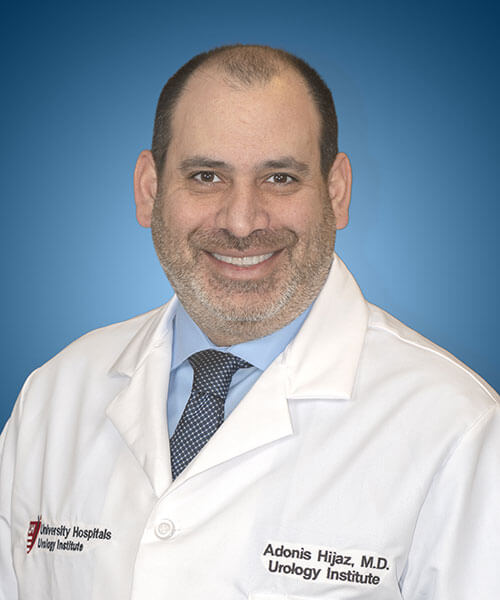The Parallel Path at University Hospitals Urology Institute
August 11, 2020
Creating a culture where clinical and academic medicine both thrive
Innovations in Urology | Summer 2020
In the hallways and conference rooms of the University Hospitals Urology Institute, one can feel the energy and excitement of residents, fellows, clinical faculty, and research team members. The Institute is buzzing with activity, and during the COVID-19 pandemic, Zoom meetings are countless. Research teams are starting new collaborations, exploring large databases, editing manuscripts, and assembling grant applications. “I love the energy. It is palpable,” says Adonis Hijaz, MD, Vice Chair of Academics and Research for the UH Urology Institute; and the Lester Persky Professor of Urology, Case Western Reserve University School of Medicine.
This energy did not just happen. It resulted from the concerted efforts of the Institute’s leadership, both in supporting and recruiting driven, gifted, and ambitious faculty who are true clinician scientists, and in nourishing the inquisitive minds of young students, residents and fellows. “We are all committed to providing our team members the resources and the tools they need to shine,” explains Dr. Hijaz.
 Adonis Hijaz, MD
Adonis Hijaz, MDDr. Hijaz, along with Department Chair, Lee Ponsky, MD, has actively worked to minimize or remove research roadblocks for clinical faculty. Priority No. 1 was creating a new structure to support clinicians in their research pursuits. From a structural prospective, the Center of Research and Innovation was created under the leadership of the Vice Chair of the Institute. This center is administered by the Director of Clinical Research, Britt Conroy, MD, PhD, JD, MS, who has been instrumental in helping the faculty develop and assemble large-scale grants and research ideas. She is assisted by the Manager of Research Operations, Rosemary Brewka, MS, who oversees and assists with IRB applications, clinical research compliance and credentialing, research finances, grant preparation, and day-to-day management of the research team. Three additional positions were created for statistical support, study coordination, and database management. In addition, the Institute extends collaborative hands to investigators within various schools and departments of Case Western Reserve University and other institutions.
The Parallel Path
A way for clinicians to advance healthcare through both clinical and academic medicine. With resources committed to their success, clinicians are empowered to explore and pursue their ideas that they know can advance within a well-oiled machine.
With the structural rebuild came the continued emphasis on the Institute’s culture of research and innovation. As an integral part of the mission of University Hospitals and the UH Urology Institute, a culture of strong academic research helps elevate evidence for clinical practice and feeds innovation. Research is equally significant to the Institute leadership as clinical productivity, and presents opportunities that are “fun, enjoyable and exciting,’ explains Dr. Hijaz. “Our goal is to give all our interested faculty the opportunity to participate in research, regardless of their clinical obligations. We strive to attain that by focusing on the structure and culture of research within the Institute. As a team, we are not oblivious to the challenges that face clinician scientists and clinician investigators. There are only so many hours in the day, and there is so much competition for your time between your clinical responsibilities, your personal and family obligations, and your desire to be involved in productive research.”
In addition to the limited time available to pursue research, some clinicians find the process of research challenging and can stall at the idea stage. Questions such as who to contact, which documents to prepare, and which collaborators to engage can hinder already slow progress. While all faculty are trained to be excellent surgeons and physicians, not all are trained in the systems that support and regulate research at UH.
“As a leadership team, we have laid down the infrastructure to support our faculty, our residents, and our team members in their research,” Dr. Hijaz says. “These are top-notch, well-trained physicians aspiring in their academic careers. We want to empower them to capture their ideas, translate those ideas into research projects utilizing the tools and resources we have, help them implement their projects, and move them across the finish line.”
When a Urology faculty member comes up with a research idea, a member of the clinical research team is assigned to work with that individual and help conceptualize their idea. They will then collaborate to move the idea from a concept to protocol, and advance it through various phases of implementation, data analysis, and writing until it reaches the final product, whether that is a paper or a grant.
Dr. Ponsky and Dr. Hijaz call this ‘the parallel path’ — a way for clinicians to advance healthcare through both clinical and academic medicine. With resources committed to their success, clinicians are empowered to explore and pursue their ideas that they know can advance within a well-oiled machine.
Achieving results
In the first half of 2020, the clinical research team has already submitted two large federal grants, including an RO1 grant, and the department has submitted 14 federal and foundation grants. In addition to creating a pipeline of grants in 2020, the department has also published 70 publications, submitted 53 abstracts, assisted with over 30 ongoing approved studies, and developed 13 studies at various stages of review.
“We have been fortifying the culture of research among our faculty, our leadership, and our trainees to show that the department values research as a central role in our mission,” Dr. Hijaz says. “Academic jobs where physicians are hired and told, ‘You can take two days a week to write your papers and work on research’ are the exceptions in these times. By supporting the parallel path, we can empower and engage our clinical faculty to realize their academic dreams.”
To reach Dr. Hijaz or to refer a patient to the UH Urology Institute, call 216-844-3009 or email: Adonis.Hijaz@UHhospitals.org,


